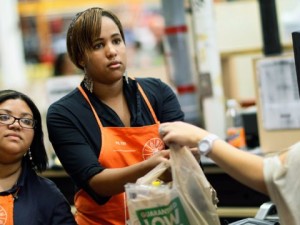Sometimes there is a piece of news that, when taken by itself, feels disheartening but bearable. But lay that news on top of other similar news bits, and it suddenly seems detrimental to the life I know. And I panic.
Does this ever happen to you?
Just last week I heard:
>>JCPenney’s is closing four stores in our state, creating a loss of approximately 175 jobs. I thought, “OK, we can recover from that.”
Later that day, I heard that >>Macy’s is closing a store in Greensboro, so another 150 people will be unemployed.
Then, the day after, the news tells me that another 130 Greensboro families will suffer when >>Kmart closes its distribution center in April.
As I sat down during my lunch break, feeling grateful I have a job, my co-worker looked at his banana and said, “Have you heard that >>Chiquita is closing?”
None of this affects me directly. I live in Durham, North Carolina, which is growing like a weed next to Raleigh’s rapidly growing rose garden, and the unemployment rate in both cities is 2% lower than it is in the rest of the nation. Still, I can’t help but wonder what this means for the future of North Carolina.
I’m familiar with the effects of job loss on a blue collar family; my parents went through a period where they couldn’t make ends meet when I was in high school.
I’ve felt the threat of layoffs. My husband and I moved to NC from New Jersey in 2008. While we were engaged, rumors of layoffs circulated through his office in Manhattan and I knew that we couldn’t afford to live in the expensive commuter town without his job and we didn’t want to live in the rural town where I worked. We didn’t own property, nor have kids, so why not try some place new? Warmer? Friendlier? With culture and small town charm?
I attended the last of the Durham Public School job fairs before the teacher freeze and secured a position. Back in New Jersey, over dinner, I would ask my husband hopefully, “Did you get laid off today?”
And he did. And we moved. I fell in the love with everything my new state had to offer. But after my husband decided to go back to school full time, loans were secured, tuition bills started rolling in, and then the teacher cuts began.
Each year for the next three years I was told how expendable I was. “Last in, first out” circled through my brain. Worry gnawed at me.
I was fortunate enough to switch to a school where I was less replaceable. My husband graduated and got a job in a growing industry, so I went back to school, bought my first house, became pregnant, and felt secure for the first time in six years.
But now, what if, with all the news of job loss that’s trickling in, the quality of life we have come to love and depend on will diminish?
And what about the families who are facing real job loss, whose spouses ask about lay offs with dread, not hope?
I take comfort in the fact that none of the announced closures seem to have anything linking them together or to North Carolina, and that >>Charlotte, Raleigh, and Greensboro have all been ranked as some of the fastest growing cities in the last year, so new jobs will be created.
And, like when I was in high school and my family’s community and friends helped support us, I know I will help those affected by layoffs and downturns as best as I can by donating to food banks, diaper banks, and other charities.
The southern hospitality I’ve come to love will be more important than ever. Let’s band together to keep this beloved state, and those in it, afloat.
>> Jennifer Brick is a writer and teacher in Durham, North Carolina. She earned her Masters of Fine Arts in Creative Nonfiction from Goucher College.
Jennifer Brick is a writer and teacher in Durham, North Carolina. She earned her Masters of Fine Arts in Creative Nonfiction from Goucher College.

What happens to any of us, happens to all of us. According to the NYT, department stores that cater to the working classes are closing down because we have less disposable income, while those that cater to the rich are doing well. Until working people earn more, have less debt, they won’t be able to support Kmart or JCPenny or Macy’s, which as the author points out, means more people will lose their jobs.
Something needs to change.